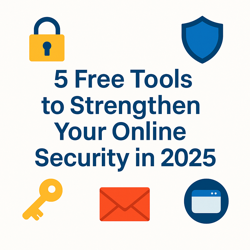
Cybersecurity is no longer a niche concern for IT professionals — it’s part of daily life for everyone. Whether you’re shopping online, logging into your work email, or streaming a movie, you’re leaving behind digital traces that hackers may try to exploit.
The good news is that you don’t always need expensive software to defend yourself. Many excellent free tools exist that provide solid protection against today’s threats. Below, we’ll look at five of the most useful, explain how they work, and why they matter in 2025.
1. Have I Been Pwned – Find Out If Your Data Is Exposed
Why it matters: Data breaches are now an everyday occurrence. In fact, millions of emails and passwords are leaked every month, often sold on the dark web.
How it works: By entering your email on Have I Been Pwned, you can instantly see if your account has been part of a breach. The database is updated regularly, pulling from real leaked records.
What to do if you’re exposed:
- Change the affected password immediately.
- Never reuse passwords across multiple accounts.
- Enable two-factor authentication wherever possible.
👉 Pro tip: You can set up free alerts so you’ll be notified if your email shows up in future breaches.
2. Bitwarden – Free Password Manager
Why it matters: Weak or reused passwords remain the easiest way for hackers to break in. Cybercriminals often use automated tools to test common passwords across multiple accounts.
How it works: Bitwarden creates and stores strong, unique passwords for all your accounts. Instead of remembering dozens of complicated strings, you only need to recall one master password.
Benefits in 2025:
- Cross-platform: Works on desktop, mobile, and browser.
- Secure sharing: Safely share login details with family or team members.
- Open source: Code is transparent, so it’s regularly audited by the security community.
👉 Even the free plan gives unlimited password storage — something most competitors reserve for paid tiers.
3. Proton Mail – Private, Encrypted Email
Why it matters: Email remains the backbone of communication, but it’s also a major target for surveillance and phishing. Traditional providers may scan your messages for advertising or be forced to hand over data to authorities.
How it works: Proton Mail, based in Switzerland, uses end-to-end encryption. This means only you and the recipient can read the message — even Proton can’t access your inbox.
Why it’s recommended:
- Privacy-first design: No ads, no tracking.
- Zero-access encryption: Messages are unreadable to anyone else.
- Integration with Proton ecosystem: Works with Proton Drive, VPN, and Calendar for secure productivity.
👉 Great choice for journalists, businesses, or anyone handling sensitive data.
4. uBlock Origin – Protection Against Malicious Ads
Why it matters: Online ads aren’t just annoying — they can be dangerous. Cybercriminals use malvertising (malicious ads) to deliver malware or redirect users to fake websites.
How it works: uBlock Origin is a lightweight browser extension that blocks ads, trackers, and harmful scripts. Unlike some ad blockers, it doesn’t just hide ads — it prevents them from loading in the first place, saving bandwidth and improving performance.
Security benefits:
- Reduces the risk of accidentally clicking malicious ads.
- Prevents tracking by advertisers and third parties.
- Speeds up browsing by cutting unnecessary code.
👉 For maximum safety, pair it with built-in browser protections like Chrome’s Enhanced Safe Browsing or Firefox’s anti-tracking features.
5. CISA Alerts – Stay Ahead of Emerging Threats
Why it matters: Cybercriminals are constantly inventing new tactics, and even well-secured systems can become vulnerable if patches are missed. Awareness is often the first line of defense.
How it works: The U.S. Cybersecurity & Infrastructure Security Agency (CISA) publishes free alerts about vulnerabilities, phishing campaigns, and large-scale attacks. Anyone can subscribe to receive them by email.
Why it’s valuable:
- Timely warnings: Get alerts about threats before they spread widely.
- Official guidance: Clear instructions on how to mitigate or patch vulnerabilities.
- Global relevance: Even though it’s U.S.-based, many alerts apply worldwide.
👉 If you run a small business or manage your family’s digital safety, subscribing to these alerts is like having a free early-warning system.
✅ Final Thoughts
Cybersecurity in 2025 is about being proactive, not reactive. You don’t need to spend money to start building good habits and defenses. Tools like Have I Been Pwned, Bitwarden, Proton Mail, uBlock Origin, and CISA Alerts are trusted, community-backed, and effective.
Action step for today: Pick at least one of these tools and set it up. Even small changes — like switching to a password manager or enabling breach alerts — can dramatically reduce your risk.
👉 Share this list with colleagues, friends, or family. The stronger each person’s defenses, the safer the digital community becomes for everyone.
